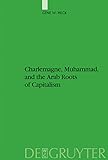Charlemagne, Muhammad, and the Arab Roots of Capitalism / Gene William Heck.
Material type: TextSeries: Studien zur Geschichte und Kultur des islamischen Orients : Beihefte zur Zeitschrift “Der Islam” ; N.F. 18Publisher: Berlin ; Boston : De Gruyter, [2008]Copyright date: ©2006Description: 1 online resource (381 p.)Content type:
TextSeries: Studien zur Geschichte und Kultur des islamischen Orients : Beihefte zur Zeitschrift “Der Islam” ; N.F. 18Publisher: Berlin ; Boston : De Gruyter, [2008]Copyright date: ©2006Description: 1 online resource (381 p.)Content type: - 9783110192292
- 9783110202830
- 330.12/2 22
- HF3868 .H43 2006eb
- online - DeGruyter
- Issued also in print.
| Item type | Current library | Call number | URL | Status | Notes | Barcode | |
|---|---|---|---|---|---|---|---|
 eBook
eBook
|
Biblioteca "Angelicum" Pont. Univ. S.Tommaso d'Aquino Nuvola online | online - DeGruyter (Browse shelf(Opens below)) | Online access | Not for loan (Accesso limitato) | Accesso per gli utenti autorizzati / Access for authorized users | (dgr)9783110202830 |
Browsing Biblioteca "Angelicum" Pont. Univ. S.Tommaso d'Aquino shelves, Shelving location: Nuvola online Close shelf browser (Hides shelf browser)
Frontmatter -- Table of Contents -- Introduction -- Part I: The Christian Decline -- Chapter 1 Medieval Christian Europe in -- Stasis -- Part II: The Islamic Ascendency -- Chapter 2 The Muslims’ Medieval “Trade -- Explosion” -- Chapter 3 Islamic “Free Market” Doctrine -- Pragmatically Applied -- Chapter 4 The Fruition of “Commercial Capitalism” -- in Fātimid Egypt -- Part III: Islam and the Christian Revival -- Chapter 5 Imperatives of Trade and the -- Transformation of Europe -- Chapter 6 Medieval Europe´s Transformation: “The -- Triumph Of Ideas” -- Backmatter
restricted access online access with authorization star
http://purl.org/coar/access_right/c_16ec
Presented in six principal analytic chapters with supporting appendices, this book explores the role of Islam in precipitating Europe’s twelfth century commercial renaissance. Employing the classic analytic techniques of economics, Gene Heck determines that medieval Europe’s feudal interregnum was largely caused by indigenous governmental business regulation and not by shifts in international trade patterns. He then proceeds by demonstrating how Islamic economic precepts provided the ideological rationales that empowered medieval Europe to escape its three-centuries-long experiment in “Dark Age economics” - in the process, providing the West with its archetypic tools of capitalism. While treatises such as Maxime Rodinson’s excellent book, Islam and Capitalism, document the capitalistic nature of the Islamic economic system, in applying modern economic method to medieval orientalist historiography, this work is unique in capturing both the evolution and the impact of the system’s role in forging medieval history.
Issued also in print.
Mode of access: Internet via World Wide Web.
In English.
Description based on online resource; title from PDF title page (publisher's Web site, viewed 28. Feb 2023)









